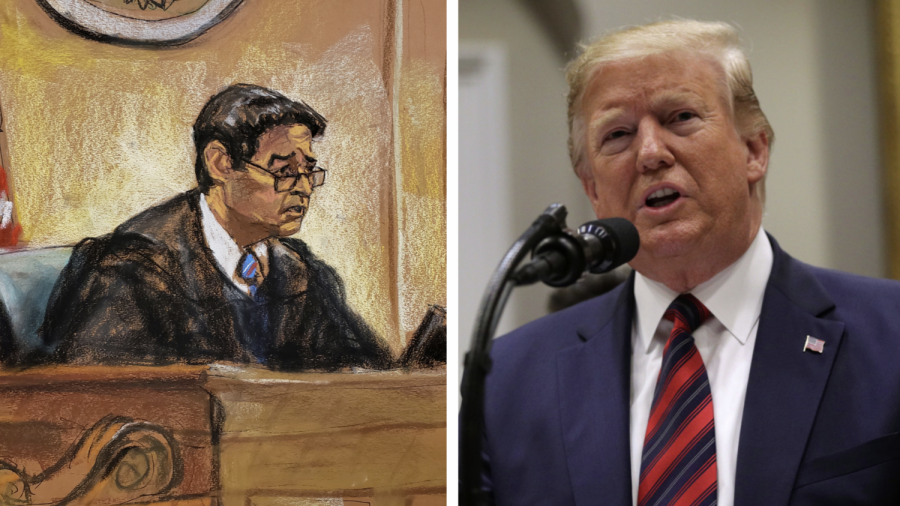A federal judge in New York in a hearing on May 22 refused to block subpoenas from House Democrats for the financial records of two banks that did business with President Donald Trump’s companies.
U.S. District Judge Edgardo Ramos said that Congress has the legal authority to demand the records, and gave seven days for the two banks—Deutsche Bank AG and Capital One Financial Corp—to comply.
The subpoenas came last month, initiated by two Democratic lawmakers of the House Financial Services and Intelligence committees, as part of their efforts to investigate alleged foreign influence by Russia in the U.S. elections.
Ramos said that the subpoenas have “a legitimate legislative purpose.” He rejected Trump’s assertions that they were barred according to federal law in the Right to Financial Privacy Act, saying the law does not apply to congressional investigations.
Ramos said that he was unwilling to delay his decision for the appeal made by Trump’s lawyers on May 21 that is still pending.
Deutsche Bank said in a statement after the ruling: “We remain committed to providing appropriate information to all authorized investigations and will abide by a court order regarding such investigations,” according to Fox News.
Capital One did not immediately respond to a request for comment when contacted by Reuters.
Lawyers for the Trump family and the Trump Organization also declined to comment on the decision, according to Reuters.
Political Agenda?
On April 29, Trump, his sons Donald Jr. and Eric, daughter Ivanka, and the Trump Organization had sought a preliminary injunction to prevent Deutsche Bank complying with the subpoenas from the House Financial Services Committee and the House Intelligence Committee, and Capital One from complying with a subpoena from the Financial Services Committee.
Lawyers for the Trumps argued that the subpoenas were too broad, and that Democrats were hoping they will “stumble upon something” that could be used for political attacks on the president.
“The subpoenas were issued to harass President Donald J. Trump, to rummage through every aspect of his personal finances, his businesses, and the private information of the President and his family, and to ferret about for any material that might be used to cause him political damage,” the lawsuit read, according to Politico.
“No grounds exist to establish any purpose other than a political one.”
Trump lawyer Patrick Strawbridge said at the hearing that the subpoenas were “the epitome of an inquiry into private or personal matters” and that the House committees were reaching beyond their role as legislators.
Douglas Letter, a lawyer for the committees, said the subpoenas were part of a “very serious investigation on behalf of the American people” that could lead to legislation aimed at reducing foreign influence in U.S. politics. He denied that it was intended to target Trump personally.
“He clearly sees us as some sort of nuisance,” Letter said.
Some parts of the subpoenas have been included in court filings. The subpoena on Deutsche Bank seeks extensive records of accounts, transactions, and investments linked to Trump, his three oldest children, their immediate family members, and several Trump Organization entities, as well as records of ties they might have to foreign entities.
Deutsche Bank has long been a principal lender for Trump’s real estate business and a 2017 disclosure form showed that Trump had at least $130 million of liabilities to the bank, Reuters reported.
The subpoena on Capital One seeks records related to multiple entities tied to the Trump Organization’s hotel business, according to Reuters.
Judges Crazy, Says Trump
The ruling marks the second time in three days that a judge has ruled against the president.
On May 20, U.S. District Judge in Washington D.C. Amit Mehta, an appointee of then-President Barack Obama, ruled that Trump’s accountants at the firm Mazars LLP had to comply with the congressional subpoena for his financial records. Mehta had also denied a request by Trump’s lawyers to stay his decision pending an appeal.
On May 21, Trump told reporters Mehta’s decision was “crazy” and that it would be appealed. “It’s totally the wrong decision by, obviously, an Obama-appointed judge,” he said.
On May 22, the House Oversight Committee involved in the case said that it had reached an agreement with Trump’s lawyers to seek an expedited appeal of Mehta’s ruling.
Democrats Escalate Investigations
Trump views various Democrat-led inquiries as an effort to impede his work.
Democrats started investigating the president after gaining control of the House of Representatives in the 2018 midterm election. The number and intensity of the investigations ramped up greatly after special counsel Robert Mueller concluded that Trump didn’t collude with Russia.
The effort to obtain Trump’s financial records was one of three investigations launched by Democrats on three key House committees on April 3. The other probes are seeking the commander-in-chief’s tax returns and the unredacted Mueller report. The number of inquiries led by House Democrats has since grown to 10.
The White House is refusing to comply with the Democrats on most fronts. Treasury Secretary Stephen Mnuchin defied a House Ways and Means Committee subpoena for Trump’s tax returns. The White House, at the request from Barr, asserted executive privilege over the redacted material in the Mueller report.
Democrats have responded by threatening and acting on threats to hold officials in contempt and asking the courts to intervene.
The Epoch Times’ reporter Ivan Pentchoukov, and Reuters contributed to this report

